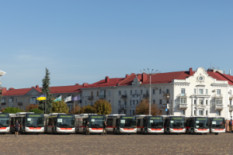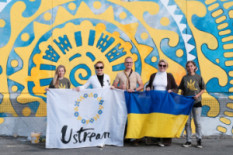11 years ago, on the eve of Euromaidan, Oleksandra moved to Austria with her three young children. At that time, she had no plans for any active professional or social activities, but the historically significant events in Ukraine prompted her to act.
The Revolution of Dignity was the starting point for her immersion in activism. Ms. Sayenko admits that she simply could not stay at home, so she started looking for the Ukrainian community and joined rallies in Vienna. Almost immediately, she realized that for Ukrainians to be more effective, they would need her experience as both a communicator and a Germanist, who not only knows the language of the country well but also has a deep understanding of the cultural context. Thus began her journey in activism and cultural diplomacy.
Oleksandra founded and continues to develop the UStream project, which has become a recognizable brand and now includes not only a multidisciplinary festival, but also regular cultural and educational events and the UStream Runners running club.

Start of public activities in Austria
“11 years ago, I moved to Austria with my three young children. It was on the eve of Euromaidan. At that time, I was not a civic activist and did not even plan to go to work. But when I saw what was happening in my home country, I couldn't stay away. As early as December 2013, Ukrainians were already organizing demonstrations, and I joined them in January and saw what I could do to improve, given my professional background.”
After joining the Ukrainian community in Vienna, Oleksandra began to work for results and took full responsibility for organizing cultural events, bringing them to a new level. To better position their activism, she admits that activists did not always have enough knowledge and skills in public communications, language skills, and cultural context. She brought all this to the Ukrainian social movement.
“I had practical experience in PR, an academic background, and a competent level of German, which is very important in building communication. In addition, I was also the author of a practical and theoretical course on PR text, which I taught to masters at a Kharkiv university. I joined the NGO as a press spokesperson.”

Throughout 2014, Oleksandra and her organization were the voice of Ukraine in Austria. At that time, it was the representatives of civil society who communicated with the international community and the media, talked about Ukraine, political events, and presented our culture and art. This was the beginning of what is commonly called cultural diplomacy.
“When a new ambassador was appointed at the end of 2014, we initiated the first Ukrainian Cultural Days in the history of bilateral relations between the two countries.”
Creation and development of the UStream project
Oleksandra took over the implementation of the Days of Ukrainian Culture. Using her experience, knowledge, creativity, energy, and partially her own funds, she and a few like-minded people managed to organize an event in a few months that was bigger than diplomats, the community, and the activist herself had expected.
“In a few months, I organized a multidisciplinary festival. The program included music and visual arts, literary readings and theater. It looked so powerful and professional that no one could believe that the event was organized by an activist, and almost single-handedly. From production and fundraising, to formulating the concept and messages, to logistics and ticket sales. In addition, I also co-financed the project. So I was both a volunteer and a patron.”

Despite the overwhelming success of the event, Oleksandra wanted to stop her work as a volunteer organizer because it requires a lot of resources. However, like-minded people convinced her to continue, as it was essential to support Ukrainians and Ukraine.
“Two years after the first event, I decided to continue. At that time, our Ministry of Foreign Affairs was already actively promoting the idea of cultural diplomacy, which Minister Pavlo Klimkin strongly supported because it was close to him.
In 2016, I was his freelance advisor because, in addition to my academic background, which implies systematicity, ability to analyze and reflect, I also had practical experience. So I realized that what was needed was not just another “culture day,” but a brand that would build a certain level of recognition. And then it would be possible to build publicity capital around it. So I took up branding: I came up with the name UStream myself, which was supposed to reflect speed, strength, and movement, and ordered an identity.
Austria is very sensitive to classical music, so music events have always been a key event in the program. We always organize a big event, after which there is an opportunity for the guests of honor to talk.”
Over the years, Ukrainian and Austrian businesses have contributed to the funding of the project. Grants were provided by the city of Vienna and the state of Salzburg. And the penultimate festival, held in 2019, finally received support from the Ukrainian state.
“In 2019, the Ukrainian state, represented by the newly created Ukrainian Institute, held the bilateral Ukraine-Austria Year of Culture. The program included more than 200 events, and our gala concert dedicated to the 100th anniversary of Ukrainian cultural diplomacy was included in this program.”
To date, four UStream festivals have been held. The goal has been achieved - the brand has become recognizable. And like every successful project, it scaled up: another direction appeared — UStream Event.
“For the past two years, I have been organizing cultural, artistic, and intellectual events, but not as part of the festival, but separately, sporadically. They are very different in their directions and formats, but there are quite a few of them. I called this area of activity UStream Event.
With the full-scale invasion, the number of Ukrainians in Austria has increased significantly - there are 20,000 of them in Vienna alone. And now Ukrainians are creating demand for their own product. So now I organize events mainly for my compatriots.

For example, in September, I organized a screening of feature films starring Bohdan Beniuk. He and the director of one of the films, Zaza Buadze, came to the event. It was a full house - a few days before the screening, there were no tickets on sale.
People who are physically separated from their homeland need an emotional connection with it. In addition, the full-scale war was an impetus for the formation of self-awareness. Today, many more Ukrainians are thinking about their own identity and trying to figure it out. So we are developing this whole area to help them.
For example, on the eve of the screening, we organized a meeting with the actor and director, where we talked for two hours about cultural identity and tried to find answers to questions that have been haunting us for almost three years.”
In addition to cultural and artistic events, the UStream brand is also implementing another unique project for Austria: the UStream Runners national running club.
“About 10 years ago, at the age of 39, I took up running. I ran a half-marathon and then a marathon. Vienna regularly hosts a large-scale international marathon, and I became its ambassador for Ukraine. Now our runners take part in international competitions with the flag of the club and Ukraine. This is also part of Ukraine's branding.”
Personal values and motivation
Ms. Oleksandra jokingly calls UStream her fifth child, as she puts her whole soul into the development of the project. Speaking about her personal motivations, she emphasizes a sense of responsibility for a decent presentation of Ukraine, as well as her irrepressible perfectionism and desire to do everything at the highest level.
“I am an indifferent person both in my profession and in my personal life - anywhere. That's why everything I touch has to be done to the best of my ability. I cannot sleep when something is done carelessly and poorly. When I saw the positive feedback to our first activities, I decided that we should continue. All these people — caring Austrians who want to understand — should be able to get information and learn about Ukraine through our events. I am a part of Ukraine and I want to show it to the world with dignity. And now Ukrainians who find themselves abroad also need this work.”
The uniqueness of Ukrainians and their potential
The cultural manager emphasizes the peculiarities of Ukrainians who became refugees. She emphasizes their resilience, high level of education, and desire for integration.

“In my work, I see Ukrainians who do not isolate themselves, but rather try to integrate, while maintaining an emotional connection with their homeland. These are mostly women and children. Women are highly educated and highly skilled, which is not typical for refugees in Europe. Although they cannot find a job that matches their status and qualifications, they make great efforts. While receiving social assistance, they are looking for work because they do not want to be an economic or social ballast. This distinguishes them from other refugees, and even from average citizens of the country. Ukrainian women are the epitome of resilience.”
Strategic tasks at the state level
Oleksandra believes that it is now important to formulate cases about the unique experience of Ukrainians and to promote our narratives internationally. This is our strategic task.
“In order to disseminate successful Ukrainian cases on a large scale, we need to organize events of different formats and with different target audiences: business unions, officials, politicians, and others. Our speakers and experts are very valuable in terms of this specific, purely national expertise that no one else has. But in order to spread it, it is necessary for theorists and practitioners to work together and for there to be systematic support at the state level.”
Oleksandra Sayenko's experience is one of those cases that should be formulated and disseminated. It is an example of how one person can launch large-scale processes, change things, support her country and transform its image in the eyes of the world.
One of Oleksandra's goals is to change the world for the better. And these are not pompous words, but rather a goal she is capable of achieving.







